Governance and Finance
Corporate governance today is about more than just making profits for shareholders. It now aims to balance the needs of all stakeholders-employees, investors, creditors, and business partners. Good governance helps companies run better, attract talent, gain customer trust, and lower financial costs. Conversely, poor governance can lead to scandals, job losses, and broken contracts.
The “Governance and Finance” research group studies how governance works in modern financial markets. One of the focuses is on how firms choose, motivate, and keep talented leaders, especially CEOs, since exemplary leadership is key to company success.
The group is also interested in investigating how changes in financial markets, like the rise of big shareholders, activist investors, or even creditors, affect company decisions. The goal is to understand how different players and institutions influence company behavior and what that means for the future of business.
Research Cluster
Financial Resilience and RegulationYour contact

- Department Financial Markets
Refereed Publications

Stock Liquidity, Empire Building, and Valuation
in: Journal of Corporate Finance, 2021
Abstract
We conjecture that high stock liquidity negatively affects firm valuation by inducing inefficient investment. Using takeovers of public targets to study the empire-building motive, we find that a liquid firm is more likely than an illiquid firm to acquire a public firm. Such a takeover by a bidder with higher stock liquidity destroys bidder value to a larger degree. These patterns occur in both stock and cash acquisitions and hold after we use decimalization of tick size as a quasi-exogenous shock to stock liquidity. Finally, we show that financial constraints and corporate governance play important roles in the effects of stock liquidity on empire building in mergers and acquisitions.
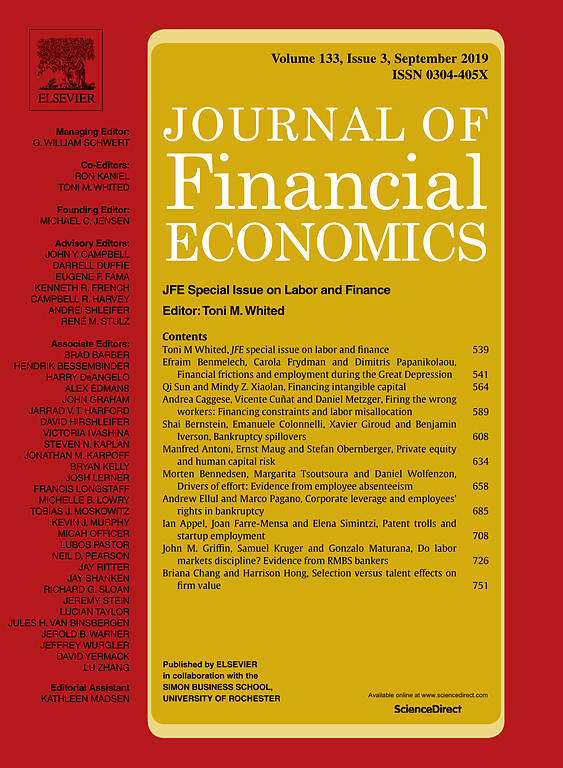
Do Activist Hedge Funds Target Female CEOs? The Role of CEO Gender in Hedge Fund Activism
in: Journal of Financial Economics, No. 1, 2021
Abstract
Using a comprehensive US hedge fund activism dataset from 2003 to 2018, we find that activist hedge funds are about 52% more likely to target firms with female CEOs compared to firms with male CEOs. We find that firm fundamentals, the existence of a “glass cliff,” gender discrimination bias, and hedge fund activists’ inherent characteristics do not explain the observed gender effect. We also find that the transformational leadership style of female CEOs is a plausible explanation for this gender effect: instead of being self-defensive, female CEOs are more likely to communicate and cooperate with hedge fund activists to achieve intervention goals. Finally, we find that female-led targets experience greater increases in market and operational performance subsequent to hedge fund targeting.
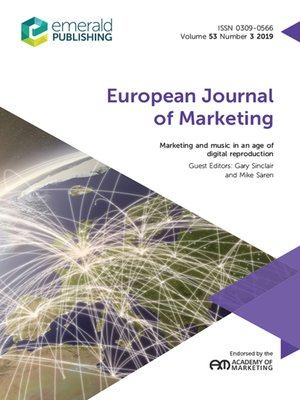
Executives with Customer Experience and Firm Performance in the B2B Context
in: European Journal of Marketing, No. 7, 2021
Abstract
<i>Purpose:</i> This paper aims to examine the presence of an executive with customer experience (ECE) in a supplier firm’s top management team (TMT). The role of ECE presence remains understudied in the marketing literature. This study attempts to examine the relationship between ECE presence and firm performance. <i>Design/methodology/approach:</i> This paper draws on the resource-based view of the firm and adopts a panel firm fixed effects estimator to test the proposed hypotheses. The empirical analysis uses a sample of 1,974 firm-year observations with 489 unique supplier firms. Selection-induced endogeneity is mitigated through the Heckman procedure. <i>Findings:</i> ECE presence improves firm performance. Additionally, firms benefit less from ECE presence if a board member with customer experience (BCE) is also present, if a chief executive officer commands a higher pay slice (compared to other executives), and if a TMT is more functionally diversified. However, ECE presence is particularly beneficial if the overall economy is in contraction. Comparing the functional positions held by ECEs reveals that ECE in the marketing function (as a chief marketing officer) offers the largest benefit to an average supplier firm. ECE presence is also associated with other firm outcomes (e.g. bankruptcy odds, innovation and customer orientation).
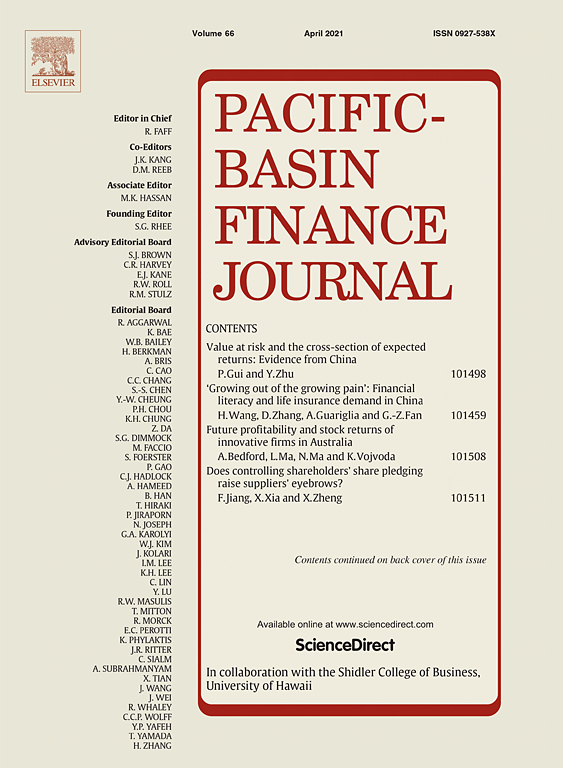
The Effect of Language on Investing: Evidence from Searches in Chinese Versus English
in: Pacific-Basin Finance Journal, June 2021
Abstract
This study examines the language effect on investing behavior in local stock markets for local- and foreign-language investors using Google search records. First, we find that attention to a local language stimulates attention to a foreign language, increases abnormal news coverage, and has better predictability on stock returns. Second, investors who do Google searches in the local language react faster to a news event's shock than those who search in the foreign language. Third, only attention to the local language can reduce the price drift of an earnings surprise. Last, firm-level information asymmetry is a channel for local advantage. Therefore, we suggest that investors who use a stock market's local language have a local advantage when seeking more profitable investment opportunities in that stock market.
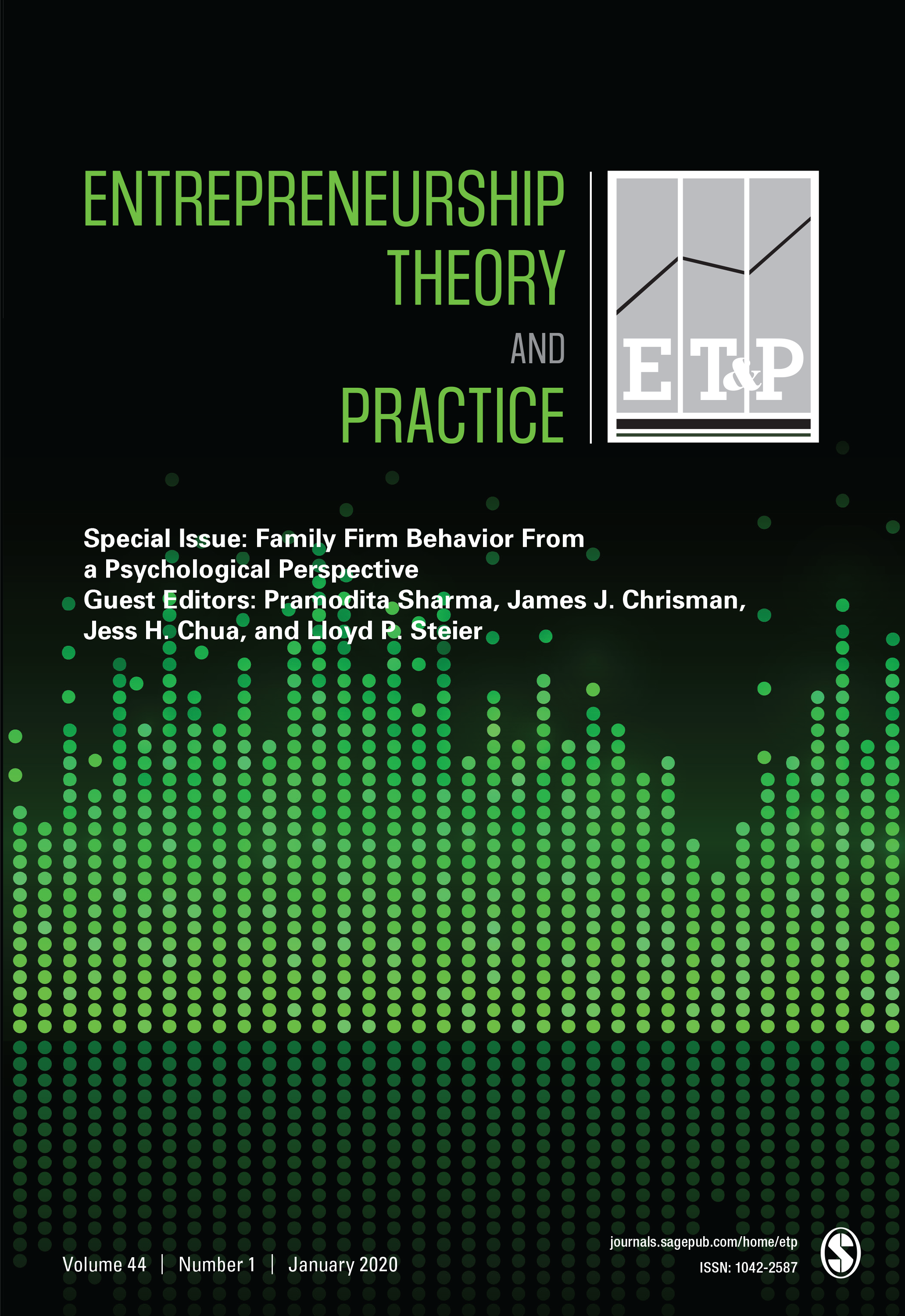
Equity Crowdfunding: High-quality or Low-quality Entrepreneurs?
in: Entrepreneurship, Theory and Practice, No. 3, 2021
Abstract
Equity crowdfunding (ECF) has potential benefits that might be attractive to high-quality entrepreneurs, including fast access to a large pool of investors and obtaining feedback from the market. However, there are potential costs associated with ECF due to early public disclosure of entrepreneurial activities, communication costs with large pools of investors, and equity dilution that could discourage future equity investors; these costs suggest that ECF attracts low-quality entrepreneurs. In this paper, we hypothesize that entrepreneurs tied to more risky banks are more likely to be low-quality entrepreneurs and thus are more likely to use ECF. A large sample of ECF campaigns in Germany shows strong evidence that connections to distressed banks push entrepreneurs to use ECF. We find some evidence, albeit less robust, that entrepreneurs who can access other forms of equity are less likely to use ECF. Finally, the data indicate that entrepreneurs who access ECF are more likely to fail.
Working Papers
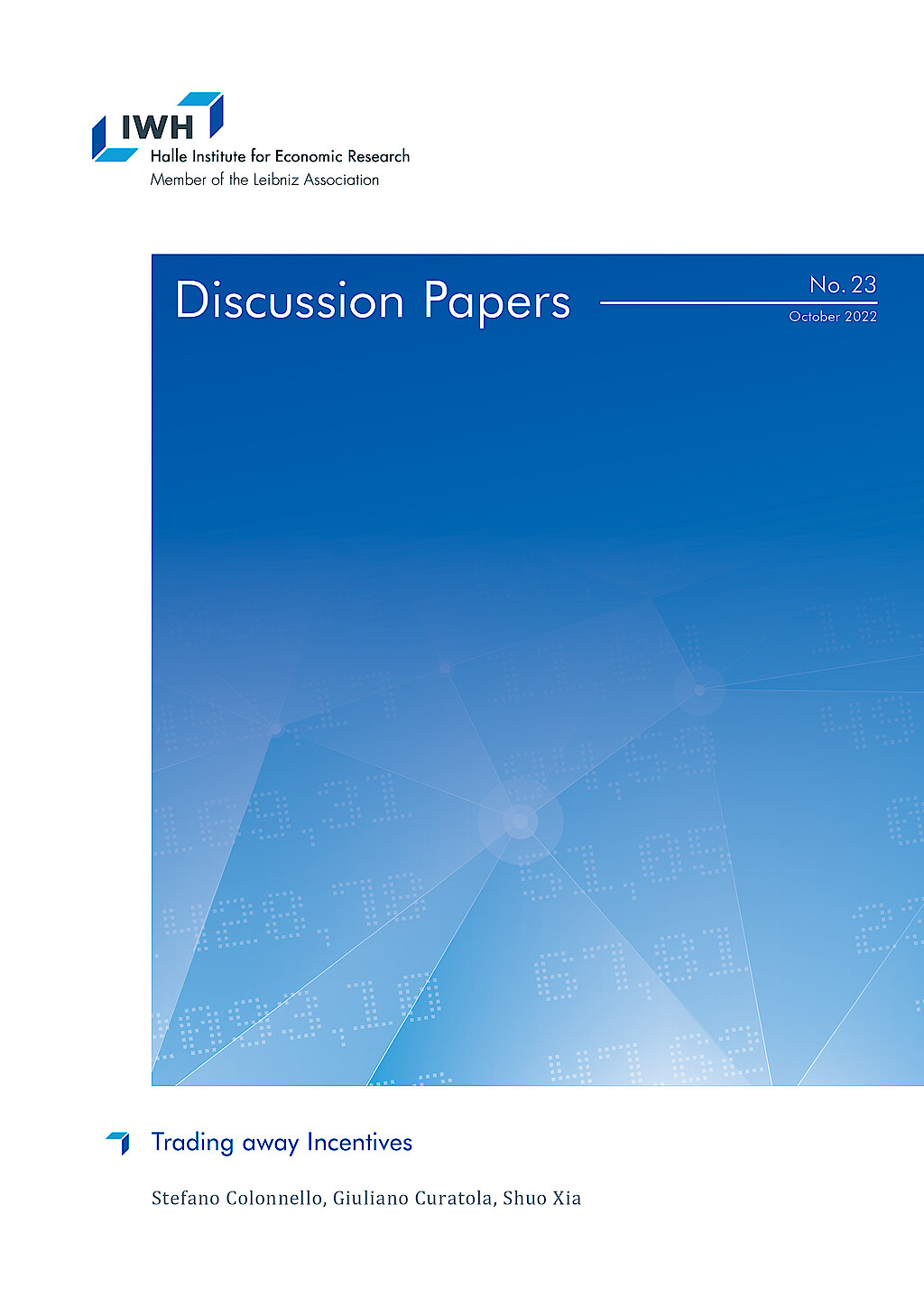
Trading away Incentives
in: IWH Discussion Papers, No. 23, 2022
Abstract
Equity pay has been the primary component of managerial compensation packages at US public firms since the early 1990s. Using a comprehensive sample of top executives from 1992-2020, we estimate to what extent they trade firm equity held in their portfolios to neutralize increments in ownership due to annual equity pay. Executives accommodate ownership increases linked to options awards. Conversely, increases in stock holdings linked to option exercises and restricted stock grants are largely neutralized through comparable sales of unrestricted shares. Variation in stock trading responses across executives hardly appears to respond to diversification motives. From a theoretical standpoint, these results challenge (i) the common, generally implicit assumption that managers cannot undo their incentive packages, (ii) the standard modeling practice of treating different equity pay items homogeneously, and (iii) the often taken for granted crucial role of diversification motives in managers’ portfolio choices.
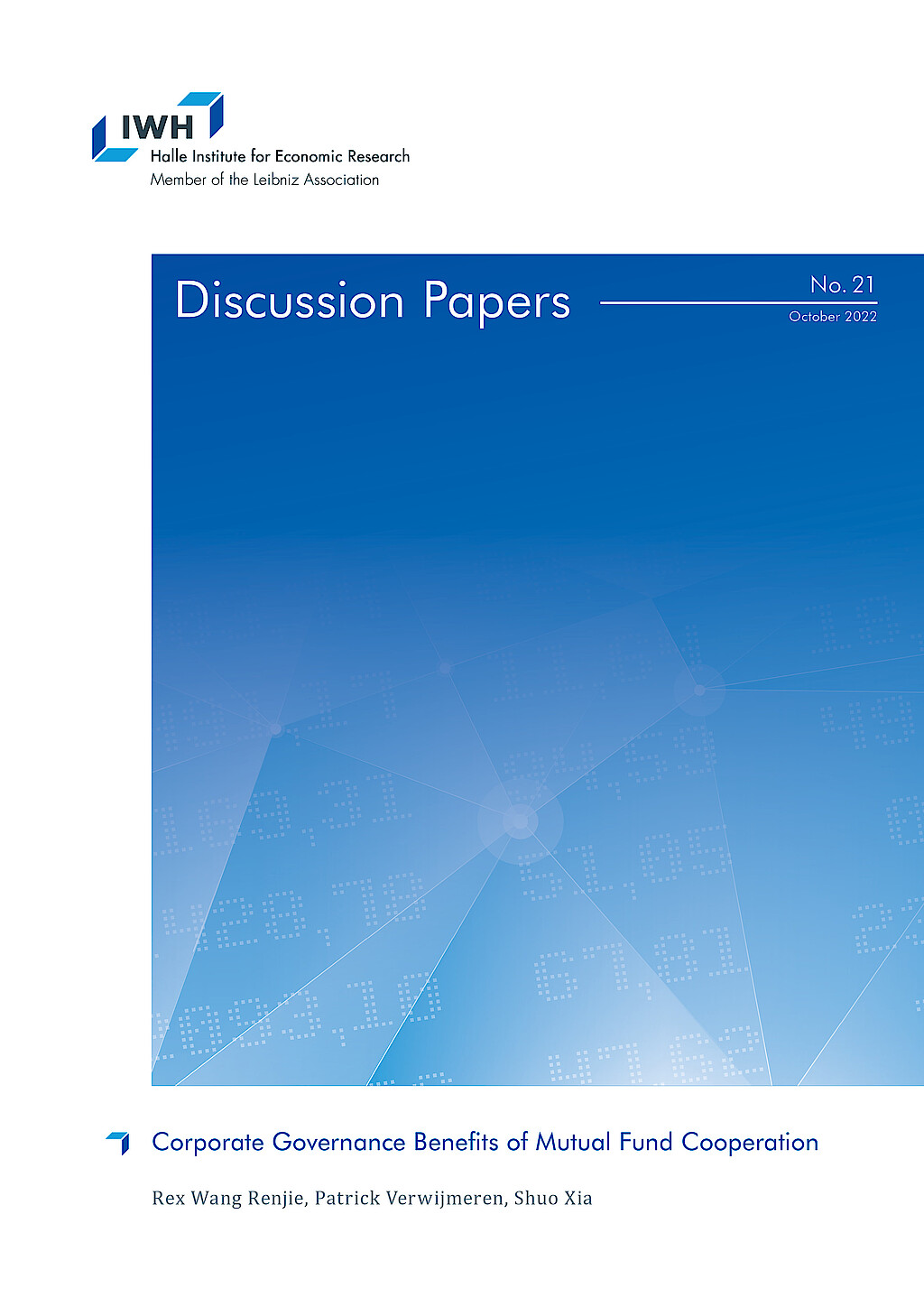
Corporate Governance Benefits of Mutual Fund Cooperation
in: IWH Discussion Papers, No. 21, 2022
Abstract
Mutual fund families increasingly hold bonds and stocks from the same firm. We study the implications of such dual holdings for corporate governance and firm decision-making. We present evidence that dual ownership allows financially distressed firms to increase investments and to refinance by issuing bonds with lower yields and fewer restrictive covenants. As such, dual ownership reduces shareholder-creditor conflicts, especially when families encourage cooperation among their managers. Overall, our results suggest that mutual fund families internalize the shareholder-creditor agency conflicts of their portfolio companies, highlighting the positive governance externalities of intra-family cooperation.

Why Do Workers at Larger Firms Outperform?
in: Working Paper, 2020
Abstract
Workers at larger firms outperform on average. For example, equity analysts working for more reputable brokerage firms produce more accurate earnings forecasts. Analysts employed by the highest ranked brokerages are about 6% more accurate than those employed by the lowest ranked brokerages, which is equivalent to an advantage of 17.5 years of more experience. This outperformance is driven by two significant effects: more reputable firms provide more resources that improve analysts' forecasting ability (influence), while more reputable firms also attract more talented candidates (sorting). We estimate a two-sided matching model to disentangle these two effects. We find that the direct influence effect accounts for 73% of the total impact while the sorting effect accounts for the remaining 27%.

Lame-Duck CEOs
in: SSRN Working Papers, 2018
Abstract
We examine the relationship between protracted CEO successions and stock returns. In protracted successions, an incumbent CEO announces his or her resignation without a known successor, so the incumbent CEO becomes a “lame duck.” We find that 31% of CEO successions from 2005 to 2014 in the S&P 1500 are protracted, during which the incumbent CEO is a lame duck for an average period of about 6 months. During the reign of lame duck CEOs, firms generate an annual four-factor alpha of 11% and exhibit significant positive earnings surprises. Investors’ under-reaction to no news on new CEO information and underestimation of the positive effects of the tournament among the CEO candidates drive our results.

Selection Versus Incentives in Incentive Pay: Evidence from a Matching Model
in: SSRN Working Papers, 2018
Abstract
Higher incentive pay is associated with better firm performance. I introduce a model of CEO-firm matching to disentangle the two confounding effects that drive this result. On one hand, higher incentive pay directly induces more effort; on the other hand, higher incentive pay indirectly attracts more talented CEOs. I find both effects are essential to explain the result, with the selection effect accounting for 12.7% of the total effect. The relative importance of the selection effect is the largest in industries with high talent mobility and in more recent years.










